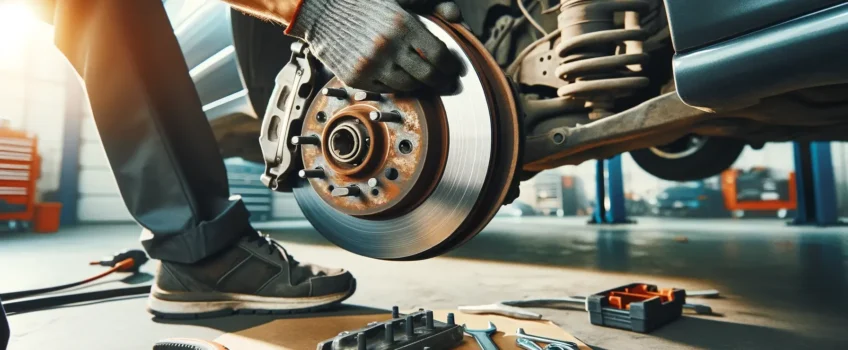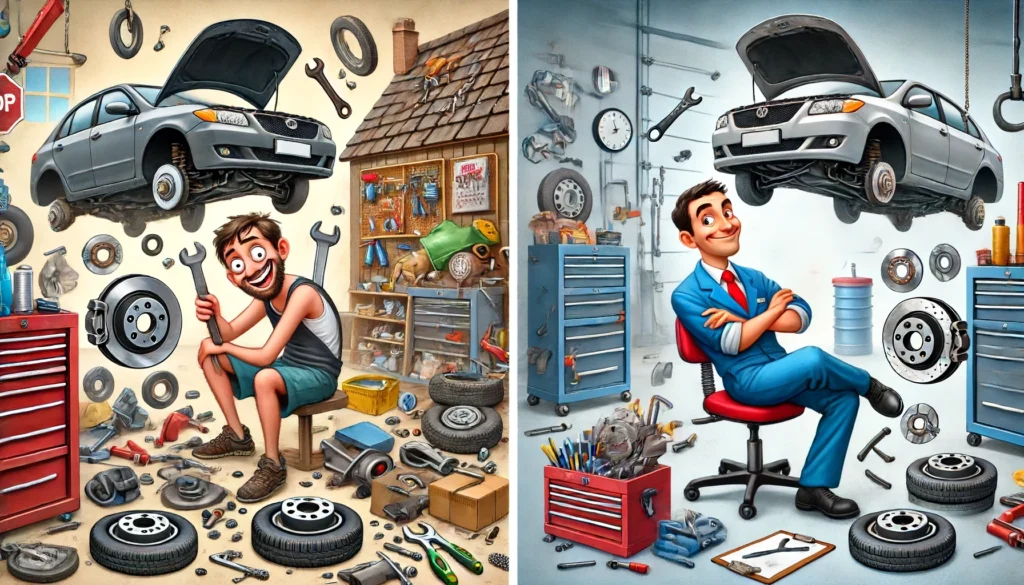
Brake Repair Essentials: How to Maintain Your Brakes for Safe Driving
Every motorist understands that reliable brakes are fundamental to safe driving. However, regular brake inspections are often neglected until a problem surfaces. This brake repair guide highlights why maintaining your braking system is not just a good habit but essential for the safety of everyone on the road.
Understanding Your Car Brakes
Brakes are more than just a pedal; they form a sophisticated system engineered to stop your vehicle safely and efficiently. Key components like brake pads, discs, and callipers work together to slow your car through friction. Regularly inspecting these parts can identify wear before it leads to failure. Understanding their interactions helps you recognise when maintenance is needed, ensuring timely and effective brake repairs.
Warning Signs of Brake Problems
As a responsible driver, it’s important to know when your brakes need attention. Recognising warning signs can prevent potential accidents and save you costly repairs. Here are some red flags that signal it’s time for brake repair:
- Squeaking or grinding noises when applying the brakes
- Vibrations or pulsating feeling while braking
- Longer stopping distance than usual
- Pulling to one side while braking
- Burning smell coming from the wheels after driving
If you experience any of these symptoms, book a brake inspection as soon as possible.
Preventive Maintenance for Brakes
Regular brake maintenance can save you from costly repairs in the long run. For instance, replacing worn brake pads is much cheaper than repairing damaged discs and rotors. Neglecting your brakes can also lead to more severe problems, such as a complete failure of the braking system, which puts your safety at risk and requires expensive repairs. To ensure your brakes are always in top condition, follow these simple tips:
- Ask a professional technician to inspect your brakes at least every six months or every 6,000 miles.
- Replace brake pads before they wear out completely to avoid damaging other components.
- Avoid harsh braking, as it can wear out your brake pads and discs faster.
- Keep an eye on the brake fluid level and top up if needed.
- Check for any leaks or damage to the brake lines and hoses.
It’s best to replace brake pads and discs as per your manufacturer’s recommendations, which you should find in your vehicle owner’s manual. Keeping up with these simple steps will significantly reduce the risk of brake-related incidents on the road.
When Should I Replace My Car Brakes?
The lifespan of car brakes can vary depending on driving habits, terrain, and the type of brake components used. On average, brake pads should be replaced every 50,000 miles, while brake discs may last up to 70,000 miles. However, it’s crucial to rely on regular inspections rather than mileage alone as a guide for your brake replacement. Your vehicle technician will also consider factors like brake pad thickness and brake pad wear patterns to determine when a replacement is necessary.
DIY Brake Jobs vs Professional Brake Repair
While there are plenty of DIY videos and guides available online for brake repairs and replacements, it’s essential to understand the limitations. For safety reasons, it’s always recommended to have a certified technician inspect and repair your brakes. They have the necessary knowledge, tools, and experience to spot potential issues that you may miss. Furthermore, a professional service will come with a warranty or guarantee for their work, giving you peace of mind on the road.
The Role of Brakes on Tyre Wear and the Benefits of Wheel Alignment
Improperly aligned wheels can lead to uneven tyre wear, which in turn can affect braking efficiency. Regular wheel alignment checks should be part of your maintenance routine to ensure that both your tyres and brakes are in optimal condition. This not only extends the life of your tyres but also helps maintain the effectiveness of your braking system, ensuring that brake repair issues do not arise from preventable wear and tear.
Recommended: Wheel Tracking: The Secret to Longer-Lasting Tyres and Better Handling
Clutch Service and Maintaining Your Cars Tyres
Your vehicle’s clutch and tyres also play significant roles in overall driving performance and safety. Scheduling regular checks on these as well can keep your car running smoothly. This includes clutch service to ensure that gear transitions are seamless and maintaining your car’s tyres to complement your brake system’s effectiveness.
Need A Brake Repair?
Maintaining your vehicle’s brakes is not just about avoiding repair costs; it’s about safeguarding your journey. Regular brake repair and maintenance checks are the best ways to ensure that every trip you take is safe. Don’t wait for the warning signs. Be proactive about your vehicle’s braking health.
If you think your car’s brakes may need attention, book a free brake check and speak to our experts. They will be able to see if you need a comprehensive brake repair service that guarantees peace of mind on every drive.
FAQS:
Click the + to read any answer or visit our most FAQ page to review the most frequently asked questions across all our Elite Locations.
If you click on a ‘Category’ or ‘Tag’ link, the page will ‘refresh’ and reload the page showing the top of the page first, you’ll then just need to scroll down to the FAQ section to see the results for the Category or Tag you selected.
The frequency of brake service can depend on various factors including driving habits, driving conditions, and the type of vehicle. However, a general rule of thumb is to have your brakes inspected at least once a year or every 10,000 to 15,000 miles. Of course, if you notice any unusual sounds, reduced brake responsiveness, or any other irregularities in braking performance, it’s important to seek professional brake service immediately.
The time between brake services is influenced by the quality of components used, the expertise of the servicing team, and the car’s usage patterns. Brake pads, for example, typically need replacement every 30,000 to 70,000 miles, though this can vary. It’s best to keep an eye on your brake pads or brake discs and to book a free visual brake inspection at Elite Garages if you have any doubt..
Absolutely! Brake service is integral to not only your car’s performance but, more importantly, to your safety and that of other road users. Brake systems are subjected to wear and tear over time, and regular servicing ensures they remain effective and responsive. Ignoring brake service can lead to decreased brake efficiency, posing potential risks on the road. In essence, a routine brake service is a small investment that yields significant returns in safety, performance, and vehicle longevity
About Us
Opening Times
Saturday : 8:30–4:00
Sunday : closed
More Information
Contact UsCustomer Information Pack
Check MOT Due Date
Free MOT reminder
Careers



